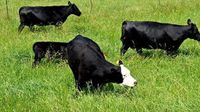The North Carolina House Agriculture and Environment Committee made a significant move on Wednesday, March 19, 2025, by approving HB 134, a bill aimed at regulating labels for meat alternatives, before sending it to the House Rules Committee. Dubbed "Prohibit Misbranding of Certain Food Products," this legislation mandates that manufacturers distinctly label alternative protein products separate from meat products. Specifically, the bill stipulates that any "manufactured-protein food product" utilizing any "identifying meat term" must include a qualifying term such as "cell-cultured," "fake," "lab-grown," or "grown in a lab" prominently displayed in a minimum font size of 20-point.
House Representative Jimmy Dixon, the bill's primary sponsor, emphasized the need for consumer awareness: "What we want is the consumer informed, and to the best of our ability, that’s what this bill does. Properly label it." In response to inquiries regarding the specific font size requirement, fellow Representative Sarah Crawford questioned its practical implications. Legislative analyst Chris Saunders clarified that the label must either be in at least 20-point font or match the size of the surrounding text, whichever is larger. Under this guideline, a typical product label will likely default to the size of adjacent text, which can often be smaller than 20-point font.
Additionally, during the committee discussions, Representative Deb Butler expressed cautious concern about the implications inherent in this bill. Butler acknowledged the inevitability of a shift toward self-cultured meat, recognizing its potential benefits—including the ability to reduce greenhouse emissions and address food scarcity. However, she framed the new labeling requirements as a potential disruption, analogizing it to how Uber transformed the transportation industry. Butler stated, "It feels like we are trying to stifle competition. It feels like we are trying to crush an industry before it gets started. I’m concerned that we are creating a regulatory barrier here, trying to stifle innovation rather than accurately labeling."
Meanwhile, further north, in West Virginia, the Senate is advancing legislation that stands in stark contrast to North Carolina's approach. On the very same day, March 19, 2025, the Senate Agriculture Committee approved SB 751, which aims to impose an outright ban on lab-grown meat without prior discussion among its members. This legislative proposal characterizes lab-grown meat as a product derived from harvesting animal cells and artificially creating tissue in a lab to mimic animal products.
If enacted, SB 751 would classify the production, sale, or distribution of lab-grown meat as a misdemeanor, punishable by a maximum fine of $500 and potentially up to one year in jail. The bill also specifies that the West Virginia Department of Health would have the authority to suspend the permits of anyone suspected of violating this prohibition, with those targeted being entitled to notice and a hearing prior to any suspension. Notably, research involving these products would not be impacted by the ban. If the Senate votes favorably, this legislation could take effect on July 1, 2025, and is currently set to sunset on July 1, 2030.
The impetus behind this ban appears to have parallels with existing similar legislation elsewhere. States like Mississippi, Florida, and Alabama have all imposed restrictions on lab-grown meat, echoing similar sentiments found in SB 751. For instance, Mississippi and Alabama carry a maximum sentence of three months in jail for violations, whereas the timeframe in Florida is set at 60 days. Each of these statutes similarly carries a cap on fines, aligning them closely with what is proposed in West Virginia.
The contrasting approaches taken by North Carolina and West Virginia illustrate a growing divergence in how states view advancements in alternative protein sources. While North Carolina champions consumer awareness through distinct labeling requirements, West Virginia takes a more prohibitive stance, imposing a complete ban on lab-grown meat amidst rising regulatory concerns about what such products encompass.
Both pieces of legislation have ignited ongoing debates among lawmakers and stakeholders in the food industry about the future of meat alternatives and lab-grown products. The tension reflects broader questions regarding innovation, regulation, and consumer rights in an evolving landscape of dietary options.
The North Carolina legislation aims to provide clarity and transparency for consumers exploring the rapidly growing market for alternative proteins. Yet, fears voiced by some legislators, like Rep. Butler, suggest potential unintended consequences that might stifle competition and innovation within this burgeoning sector. With technological growth accelerating in food production, ensuring that regulations are equitable and supportive rather than obstructive will be vital going forward.
As this legislative session evolves, both states will drive the national conversation about meat alternatives and their place in the food economy. With significant implications for consumers, producers, and innovators alike, the outcomes of these legislative measures will likely shape the trajectory of food production in the regions and potentially across the United States.


